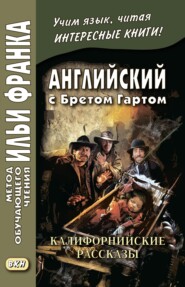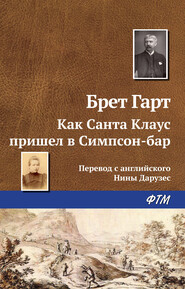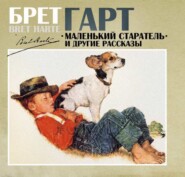По всем вопросам обращайтесь на: info@litportal.ru
(©) 2003-2024.
✖
Gabriel Conroy
Автор
Год написания книги
2017
Настройки чтения
Размер шрифта
Высота строк
Поля
Gabriel stopped his work, laid down the petticoat, and taking the curly head of Olly between his knees, with one hand beneath her chin and the other on the top of her head, turned her mischievous face towards his. "Olly," he said, seriously, "when I got you outer the snow at Starvation Camp; when I toted you on my back for miles till we got into the valley; when we lay by thar for two weeks, and me a felling trees and picking up provisions here and thar, in the wood or the river, wharever thar was bird or fish, I reckon you got along as well – I won't say better – ez if you had a woman to look arter you. When at last we kem here to this camp, and I built this yer house, I don't think any woman could hev done better. If they could, I'm wrong, and Mrs. Markle's right."
Olly began to be uncomfortable. Then the quick instincts of her sex came to her relief, and she archly assumed the aggressive.
"I think Mrs. Markle likes you, Gabe."
Gabriel looked down at the little figure in alarm. There are some subjects whereof the youngest of womankind has an instinctive knowledge that makes the wisest of us tremble.
"Go to bed, Olly," said the cowardly Gabriel.
But Olly wanted to sit up, so she changed the subject.
"The Mexican you're tendin' isn't a Mexican, he's a Chileno; Mrs. Markle says so."
"Maybe; it's all the same. I call him a Mexican. He talks too straight, anyway," said Gabriel, indifferently.
"Did he ask you any more questions about – about old times?" continued the girl.
"Yes; he wanted to know everything that happened in Starvation Camp. He was rek'larly took with poor Gracie; asked a heap o' questions about her – how she acted, and seemed to feel as bad as we did about never hearing anything from her. I never met a man, Olly, afore, as seemed to take such an interest in other folks' sorrers as he did. You'd have tho't he'd been one of the party. And he made me tell him all about Dr. Devarges."
"And Philip?" queried Olly.
"No," said Gabriel, somewhat curtly.
"Gabriel," said Olly, sullenly, "I wish you didn't talk so to people about those days."
"Why?" asked Gabriel, wonderingly.
"Because it ain't good to talk about. Gabriel dear," she continued, with a slight quivering of the upper lip, "sometimes I think the people round yer look upon us sorter queer. That little boy that came here with the emigrant family wouldn't play with me, and Mrs. Markle's little girl said that we did dreadful things up there in the snow. He said I was a cannon-ball."
"A what?" asked Gabriel.
"A cannon-ball! He said that you and I" —
"Hush," interrupted Gabriel, sternly, as an angry flush came into his sunburnt cheek, "I'll jest bust that boy if I see him round yer agin."
"But, Gabriel," persisted Olly, "nobody" —
"Will you go to bed, Olly, and not catch your death yer on this cold floor asking ornery and perfectly ridickulus questions?" said Gabriel, briskly, lifting her to her feet. "Thet Markle girl ain't got no sense anyway – she's allers leading you round in ditches, ruinin' your best clothes, and keepin' me up half the night mendin' on 'em."
Thus admonished, Olly retreated behind the canvas screen, and Gabriel resumed his needle and thread. But the thread became entangled, and was often snappishly broken, and Gabriel sewed imaginary, vindictive stitches in the imaginary calves of an imaginary youthful emigrant, until Olly's voice again broke the silence.
"Oh, Gabe!"
"Yes," said Gabriel, putting down his work despairingly.
"Do you think – that Philip – ate Grace?"
Gabriel rose swiftly, and disappeared behind the screen. As he did so, the door softly opened, and a man stepped into the cabin. The new-comer cast a rapid glance around the dimly-lighted room, and then remained motionless in the doorway. From behind the screen came the sound of voices. The stranger hesitated, and then uttered a slight cough.
In an instant Gabriel reappeared. The look of angry concern at the intrusion turned to one of absolute stupefaction as he examined the stranger more attentively. The new-comer smiled faintly, yet politely, and then, with a slight halt in his step, moved towards a chair, into which he dropped with a deprecating gesture.
"I shall sit – and you shall pardon me. You have surprise! Yes? Five, six hour ago you leave me very sick on a bed – where you are so kind – so good. Yes? Ah? You see me here now, and you say crazy! Mad!"
He raised his right hand with the fingers upward, twirled them to signify Gabriel's supposed idea of a whirling brain, and smiled again.
"Listen. Comes to me an hour ago a message most important. Most necessary it is I go to-night – now, to Marysville. You see. Yes? I rise and dress myself. Ha! I have great strength for the effort. I am better. But I say to myself, 'Victor, you shall first pay your respects to the good Pike who have been so kind, so good. You shall press the hand of the noble grand miner who have recover you. Bueno, I am here!"
He extended a thin, nervous brown hand, and for the first time since his entrance concentrated his keen black eyes, which had roved over the apartment and taken in its minutest details, upon his host. Gabriel, lost in bewilderment, could only gasp – "But you ain't well enough, you know. You can't walk yet. You'll kill yourself!"
The stranger smiled.
"Yes? – you think – you think? Look now! Waits me, outside, the horse of the livery-stable man. How many miles you think to the stage town? Fifteen." (He emphasized them with his five uplifted fingers.) "It is nothing. Two hour comes the stage and I am there. Ha!"
Even as he spoke, with a gesture, as if brushing away all difficulties, his keen eyes were resting upon a little shelf above the chimney, whereon stood an old-fashioned daguerreotype case open. He rose, and, with a slight halting step and an expression of pain, limped across the room to the shelf, and took up the daguerreotype.
"What have we?" he asked.
"It is Gracie," said Gabriel, brightening up. "Taken the day we started from St. Jo."
"How long?"
"Six years ago. She was fourteen then," said Gabriel, taking the case in his hand and brushing the glass fondly with his palm. "Thar warn't no puttier gal in all Missouri," he added, with fraternal pride, looking down upon the picture with moistened eyes. "Eh – what did you say?"
The stranger had uttered a few words hastily in a foreign tongue. But they were apparently complimentary, for when Gabriel looked up at him with an inquiring glance, he was smiling and saying, "Beautiful! Angelic! Very pretty!" with eyes still fixed upon the picture. "And it is like – ah, I see the brother's face, too," he said, gravely, comparing Gabriel's face with the picture. Gabriel looked pleased. Any nature less simple than his would have detected the polite fiction. In the square, honest face of the brother there was not the faintest suggestion of the delicate, girlish, poetical oval before him.
"It is precious," said the stranger: "and it is all, ha?"
"All?" echoed Gabriel, inquiringly.
"You have nothing more?"
"No."
"A line of her writing, a letter, her private papers would be a treasure, eh?"
"She left nothing," said Gabriel, simply, "but her clothes. You know she put on a boy's suit – Johnny's clothes – when she left. Thet's how it allus puzzles me thet they knew who she was, when they came across the poor child dead."
The stranger did not speak, and Gabriel went on —
"It was nigh on a month afore I got back. When I did, the snow was gone, and there warn't no track or trace of anybody. Then I heerd the story I told ye – thet a relief party had found 'em all dead – and thet among the dead was Grace. How that poor child ever got back thar alone (for thar warn't no trace or mention of the man she went away with) is what gets me. And that there's my trouble, Mr. Ramirez! To think of thet pooty darlin' climbing back to the old nest, and finding no one thar! To think of her coming back, as she allowed, to Olly and me, and findin' all her own blood gone, is suthin' thet, at times, drives me almost mad. She didn't die of starvation; she didn't die of cold. Her heart was broke, Mr. Ramirez; her little heart was broke!"
The stranger looked at him curiously, but did not speak. After a moment's pause, he lifted his bowed head from his hands, wiped his eyes with Olly's flannel petticoat, and went on —
"For more than a year I tried to get sight o' that report. Then I tried to find the Mission or the Presidio that the relief party started from, and may be see some of that party. But then kem the gold excitement, and the Americans took possession of the Missions and Presidios, and when I got to San – San – San – "
"Geronimo," interrupted Ramirez, hastily.
"Did I tell?" asked Gabriel, simply; "I don't remember that."

















